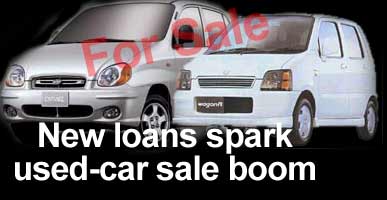
It was a dilemma on wheels for Delhi-based advertising executive Akshay Sharma. He wanted a bigger automobile but knew it would come driving into his life with an equally big price tag attached. What did he do?
He upgraded from a Maruti 800 to a second-hand Hyundai Accent. The 2001 model cost him Rs 410,000. Says Sharma, "I wanted to go for a big car but I couldn't afford a new one even on loan. A second-hand car through finance was a more affordable option."
These days a large number of people are thinking on the same lines as Sharma. They are cutting the cost of staying on the road and buying second-hand cars. What's helping them is that today a larger number of banks are giving out loans to buy second-hand cars -- provided the vehicles pass a few stringent tests and conditions. Take ABN AMRO Bank, for instance, which sanctions nearly 800 loans for used cars every month.
Buying second-hand cars is, of course, a risky business so the banks are taking no chances. Banks such as ABN AMRO, Citibank and ICICI Bank hold used car melas where second-hand cars are sold at reasonable rates.
Says Sharma, who bought his Accent at one such mela organised by ABN AMRO Bank, "The bank gives a one year warranty, a mileage guarantee and also informs you whether the car is under its first registration or second. Besides of course, giving you a loan."
However, the price of cars being sold at these melas is non-negotiable. Says an ICICI Bank executive, "Since we get these cars valued by professional valuers, we are pretty certain of their price and there is no scope for bargaining."
The banks will still lend you money even if you don't buy a car at one of these melas. In such a case, most banks send their agents to determine the market value of the car.
After going through essentials such as mileage, condition of the engine, the physical appearance etc, the value of the car is determined. Some banks such as Bank of Baroda accept a certificate from a reputed garage determining the value and the residual life of the car.
Only after the value has been ascertained is a loan offered. Most banks sanction a loan that covers between 70 per cent and 80 per cent of the market value. For a new car, nearly 90 per cent of the ex-showroom price is offered as loan.
However, be warned that the interest rates on loans for second-hand cars are much higher than they are for new cars. They are generally between 14 per cent and 18 per cent depending upon the model, the year of manufacture, the condition of the car and the loan tenure. Interest rates for big cars are generally lower since the loan amount is higher.
So, depending upon your loan amount and how much down payment you make, the interest rate can be negotiated. A luxury car such as a Mercedes can be bought at an interest rate of between 8 per cent and 10 per cent, whereas a Maruti Zen or Santro will command an interest rate of around 16 per cent.
The loan tenure is also much lower than that for a new car. In case of a new car, one can get a loan for up to five years for a standard car (up to Rs 500,000) and up to seven years for a premium car (above Rs 500,000).
However, in case of a used car, the loan tenure is generally for up to three years. Most banks put stipulations on the age of the car at maturity.
For instance, to get a loan from ICICI Bank, the car should not be more than eight years old at the time of maturity of the loan. Hence, for a 2000 model, you will get a loan for up to four years.
On the other hand, banks such as State Bank of India offer a loan for up to five years for a two-year old car and up to three years for cars that are between two to four years old. It does not give loans for cars that are older than four years.
Most nationalised banks require you to open an account with them and deposit a certain sum as margin money. In case of second-hand cars this can be as high as 40 per cent of the market value of the car.
The paperwork is the same as that for a new car. The car is in the name of the bank till the loan is repaid. Payments have to be made in the form of equated monthly instalments through post-dated cheques.
The processing fee is also higher for second-hand cars. For instance, ICICI does not charge any processing fee for loans for new cars but charges Rs 1,000 as processing fee for loans of used cars for a loan of up to Rs 110,000.








More from rediff